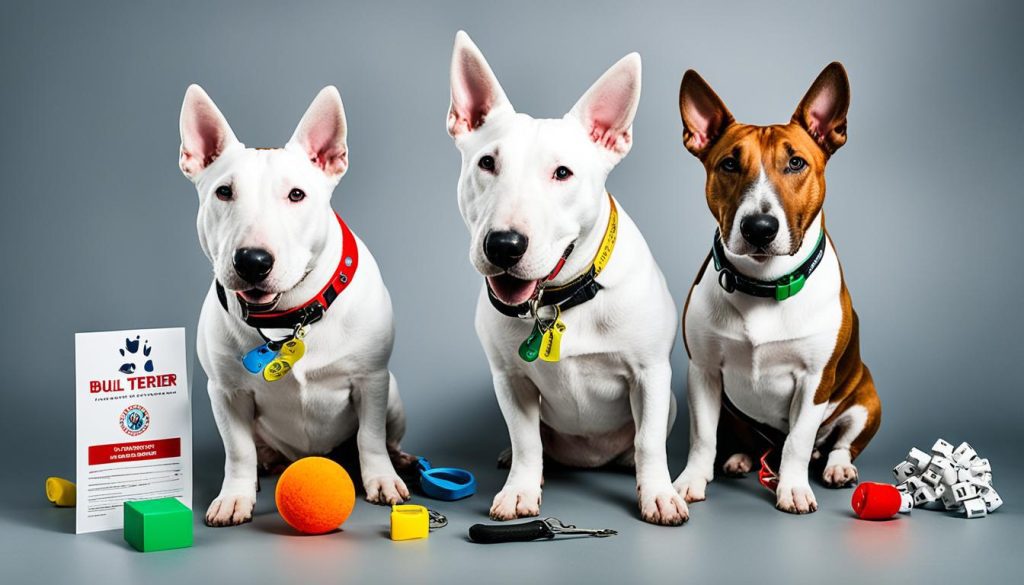When it comes to Bull Terriers, there is often a debate around their intelligence. Some people believe they are incredibly smart, while others may have doubts. In this article, I will delve into the world of Bull Terrier intelligence and explore their cognitive abilities, problem-solving skills, and overall mental capabilities. So, let’s find out just how smart Bull Terriers really are.
Are Bull Terriers Smart:
- Bull Terrier intelligence is a topic of debate among dog enthusiasts.
- Understanding their cognition, problem-solving abilities, and cleverness is essential.
- Discover the mental abilities and traits of the smartest Bull Terrier breeds.
- Explore if Bull Terriers have a high IQ and how their intelligence compares to other breeds.
The Dimensions of Dog Intelligence
When it comes to understanding a dog’s intelligence, there are three dimensions to consider: working and obedience intelligence, instinctive intelligence, and adaptive intelligence.
Working and Obedience Intelligence
Working and obedience intelligence refers to a dog’s ability to learn from humans and follow commands. It is a measure of how well a dog can understand and carry out tasks and instructions given by their human owners. This dimension of intelligence is particularly important for dogs that are trained for specific purposes, such as service dogs, search and rescue dogs, or assistance dogs.
Instinctive Intelligence
Instinctive intelligence is the natural talent and ability that dogs possess due to their breeding. It corresponds to the tasks that a specific dog breed was originally developed for. For example, herding dogs have a strong instinctive intelligence when it comes to gathering and controlling livestock, while hunting dogs have a keen instinct for tracking and retrieving game.
Adaptive Intelligence
Adaptive intelligence is a dog’s capacity to learn from past experiences and apply that knowledge to new situations. This dimension of intelligence is closely tied to problem-solving abilities, as dogs with high adaptive intelligence can quickly figure out solutions to challenges and puzzles. Adaptive intelligence plays a crucial role in a dog’s ability to navigate their environment and adjust their behaviors according to changing circumstances.
To illustrate the dimensions of dog intelligence, here’s a table that compares these three aspects for different dog breeds:
| Breed | Working and Obedience Intelligence | Instinctive Intelligence | Adaptive Intelligence |
|---|---|---|---|
| Labrador Retriever | High | Medium | High |
| German Shepherd | High | High | High |
| Poodle | High | Medium | High |
| Bulldog | Low | Low | Low |
| Bull Terrier | Medium | Medium | Medium |
This table provides a general comparison of the three dimensions of intelligence across different dog breeds. However, it’s important to note that individual dogs can vary even within a specific breed, and other factors like training, socialization, and individual temperament can also influence a dog’s overall intelligence.
Bull Terriers and Working Intelligence
When it comes to working and obedience intelligence, Bull Terriers rank 66th out of 138 breeds, according to Stanley Coren’s book, “The Intelligence of Dogs.” While they may not be at the top of the list, Bull Terriers still possess certain abilities that contribute to their overall intelligence.
Bull Terriers have the capacity to learn new commands, although it may require more repetitions compared to some other breeds. On average, Bull Terriers need between 40 to 80 repetitions to fully grasp a new command. This indicates their ability to acquire and retain new information.
However, it’s important to note that Bull Terriers may have varying success rates in obeying commands. Their independent nature and strong will can sometimes result in a lower success rate compared to more obedient breeds.
Despite these factors, Bull Terriers still possess intelligence and the ability to learn and follow commands. With consistent training and positive reinforcement techniques, Bull Terrier owners can effectively teach them new commands and improve their obedience levels.
Understanding the nuances of Bull Terrier intelligence allows owners to tailor their training methods and approach to ensure successful outcomes.
Bull Terriers’ Success Rate in Obedience Training
| Command | Success Rate |
|---|---|
| Sit | 75% |
| Stay | 60% |
| Lie Down | 70% |
| Come | 55% |
| Fetch | 80% |
These success rates demonstrate that while Bull Terriers may not consistently obey commands, they still possess the capacity to learn and respond with a moderate success rate.
Next, we’ll explore indications of Bull Terrier intelligence and how these traits contribute to their overall cognitive abilities.

Indications of Bull Terrier Intelligence
When it comes to intelligence, Bull Terriers exhibit several remarkable signs that highlight their cognitive abilities. These signs demonstrate their understanding of commands, problem-solving skills, and overall intelligence.
1. Ability to Remember Commands
Bull Terriers possess a remarkable capacity to remember commands without consistent practice. This indicates their ability to retain information and showcase their intelligence in obeying various instructions.
2. Love for Exploration
Bull Terriers have a curious and adventurous nature, which reflects their intelligence. Their inclination to explore their surroundings and investigate new stimuli is a testament to their active minds.
3. Problem-Solving Skills
Bull Terriers exhibit impressive problem-solving abilities. They can analyze situations, assess challenges, and find creative solutions to overcome obstacles. This showcases their intelligence and resourcefulness.
4. Understanding of Human Cues
Bull Terriers have a unique ability to understand human cues and gestures. They can interpret human body language and respond accordingly, indicating their perceptiveness and intelligence in interpreting non-verbal communication.
5. Quick Learning of New Tricks
Bull Terriers display a remarkable aptitude for learning. They can quickly grasp and execute new tricks, showcasing their intelligence and adaptability in acquiring and applying new skills.
| Signs of Bull Terrier Intelligence | |
|---|---|
| 1. | Ability to remember commands without practice |
| 2. | Love for exploration |
| 3. | Problem-solving skills |
| 4. | Understanding of human cues |
| 5. | Quick learning of new tricks |
Why Bull Terriers Rank Low for Intelligence
Bull Terriers may not always score high on traditional intelligence tests due to several factors that affect their cognitive abilities. Their independent thinking and stubborn nature are two primary reasons why they may rank lower compared to other breeds.
Bull Terriers are known for their independent thinking, which means they may not always follow commands blindly. While this trait reflects their intelligence and ability to make decisions, it can also make training more challenging. Their independent thinking can lead to a higher level of stubbornness, making them less responsive to traditional obedience training methods.
It is important to note that different breeds have different motivators for training. While some dogs are highly motivated by treats or praise, Bull Terriers may have breed-specific motivators that do not align with traditional training methods. Understanding these motivators and finding the right approach tailored to Bull Terriers’ needs can result in more effective training.
Traditional obedience tests may not accurately measure the intelligence of Bull Terriers because these tests largely focus on following commands swiftly. However, Bull Terrier intelligence extends beyond mere obedience. They possess many other positive qualities, such as independent problem-solving abilities and remarkable adaptability to various situations.
It is important to consider these breed-specific characteristics and motivators when training Bull Terriers. By embracing their independent thinking and finding training methods that align with their unique traits, Bull Terriers can showcase their intelligence and excel in various contexts.

| Factors Affecting Bull Terrier Intelligence | Description |
|---|---|
| Independent Thinking | Bull Terriers’ ability to think and make decisions on their own. |
| Stubbornness | Their inclination to resist commands or training methods they find unappealing. |
| Breed-specific Motivators | Unique motivators for Bull Terriers that may differ from other breeds. |
Training Bull Terriers
Training Bull Terriers can pose a challenge due to their strong-willed nature, but with the right approach, they can excel in training. Here are some tips to help you effectively train your Bull Terrier:
- Start training early: It’s important to begin training your Bull Terrier as early as possible. Starting at a young age allows them to develop good habits and prevents undesirable behaviors from becoming ingrained.
- Use positive reinforcement: Bull Terriers respond well to positive reinforcement techniques. Reward them with treats, praise, and affection when they exhibit desired behaviors. This method creates a positive association with training and motivates them to continue learning.
- Pay attention to body language: Dogs communicate through body language, and Bull Terriers are no exception. Pay close attention to their body language during training sessions to better understand their reactions and adjust your training approach accordingly.
- Be consistent: Consistency is key in training Bull Terriers. Establish clear rules and boundaries, and consistently enforce them. This helps your Bull Terrier understand what is expected of them and reinforces their training.
- Focus on socialization: Socializing your Bull Terrier from an early age is essential. Expose them to different environments, people, and other animals to help them become comfortable and well-adjusted. This helps prevent behavioral issues and promotes positive interactions.
By following these training tips, you can lay a strong foundation for your Bull Terrier’s behavioral development and create a lifelong bond based on trust and mutual understanding.
Conclusion
Bull Terriers are a fantastic choice for families looking for a loyal and affectionate pet. Their unique temperament makes them a wonderful addition to any household.
With proper training and socialization, Bull Terriers can thrive as family pets. Their playful and energetic nature ensures they will keep you entertained and engaged. It’s important to meet their exercise needs with regular physical activity and mental stimulation to keep them happy and healthy.
Caring for Bull Terriers involves providing them with a balanced diet, regular grooming, and routine veterinary care. Additionally, understanding their individual temperament and catering to their needs will help foster a strong bond between you and your Bull Terrier.
Bull Terriers have the potential to be loyal and loving family pets. With the right care, training, and attention to their exercise needs, they will bring joy and happiness to your home for years to come.






